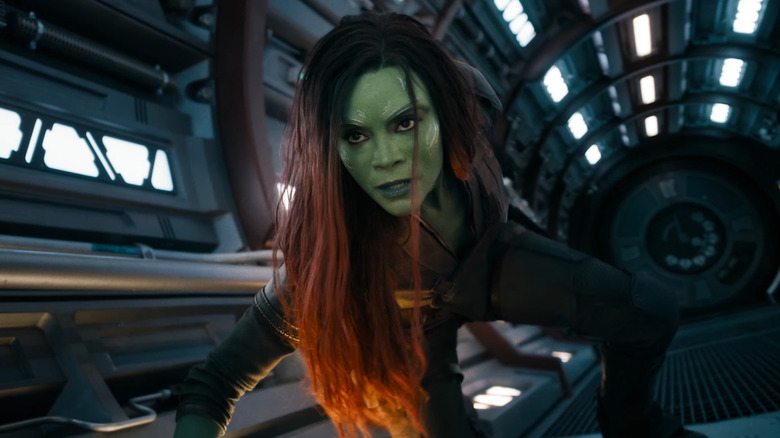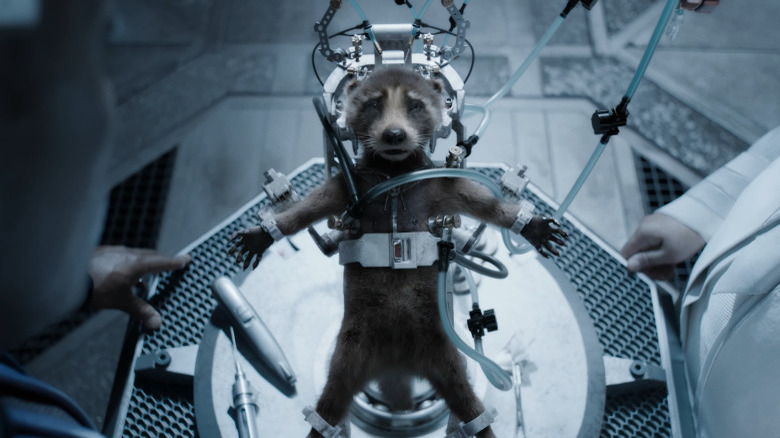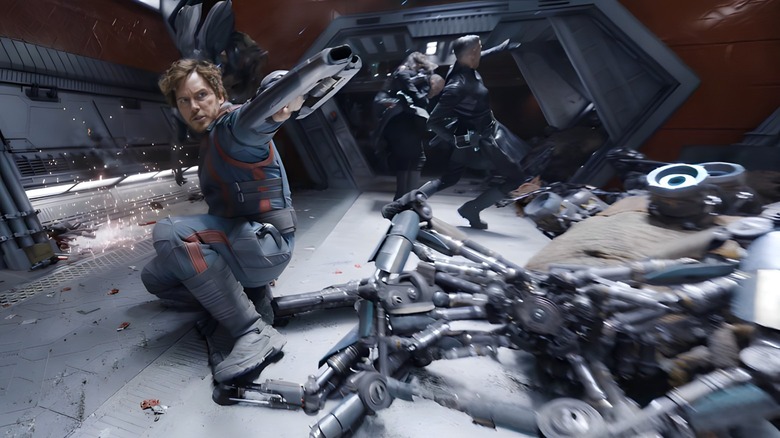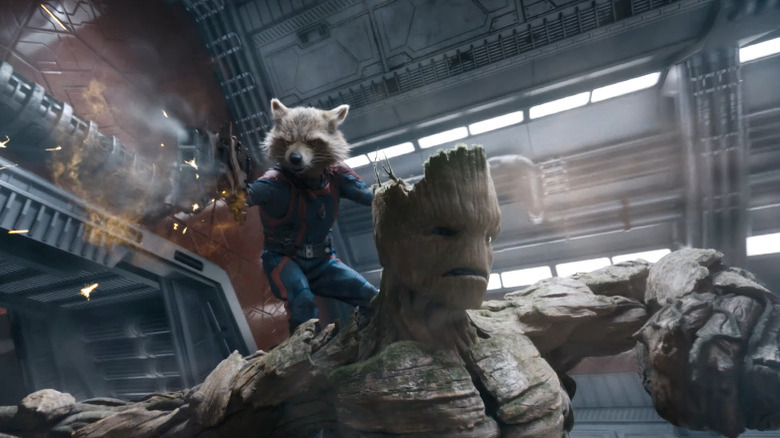The Most Badass Scene In Guardians Of The Galaxy Vol. 3 Is Its Worst
This article contains spoilers for "Guardians of the Galaxy Vol. 3."
One of the things that makes the "Guardians of the Galaxy" movies special is that they feel like weirdo Troma movies, filtered down to a PG-13. These "Guardians" movies may not push the envelope of good taste, or even bad taste, the way that a sleazoid weirdness factory like "Tromeo and Juliet" did, but they still hail from the same writer: James Gunn, who's got an unusual and mostly effective knack for combining bizarre tones and genres. He wrote a scene in which Romeo ripped open Juliet's stomach and ate popcorn from it, and it didn't ruin the romance. Now that's talent!
And sure enough, despite that PG-13 rating, "Guardians of the Galaxy Vol. 3" does an impressive job of feeling R-rated. Faces get ripped off, an f-bomb gets launched, and even though the Marvel Cinematic Universe is supposedly family-friendly, the whole movie juxtaposes wacky hijinks and awesome action with a somber, sobering tale of corporate animal abuse.
But there's one scene in "Guardians of the Galaxy Vol. 3" where Gunn seems to let go of the reins, and the movie flies off the rails. It's an action sequence that's supposed to be aesthetically thrilling — the audience in my theater certainly cheered — but flies in the face of everything the movie seems to stand for.
It's a mad, mad, mad, mad scientist
"Guardians of the Galaxy: Vol. 3" is the story of how, when Rocket (voiced by Bradley Cooper) gets seriously injured, the rest of the Guardians move heaven and earth to infiltrate a giant corporation and get him his health care. As a proprietary creation of the High Evolutionary (Chukwudi Iwuji), Rocket's biology is a heavily protected trade secret, and as his friends fight to save his life, the film flashes back to Rocket's origin story.
Rocket was once an adorable little animal who was violently experimented on, transforming him into a biped with a highly developed brain. In addition to the suffering he endures, we also meet his various animal friends, a group of extremely innocent creatures with flimsy cybernetic appliances that look like uncomfortable to live with. "Guardians of the Galaxy Vol. 3" spends a lot of time making the audience feel emotionally connected to these characters before bad things happen to them, in a scene that will tug at your heartstrings and probably traumatize younger kids in the audience.
We know the High Evolutionary has performed these abominable, torturous experiments on every single anthropomorphic animal in the movie. They are the moral spine of the motion picture, a line that the movie ultimately decides cannot be crossed. Saving the day means saving all of the animals the High Evolutionary has been experimenting on.
Except for the ones the Guardians mass murder in a climactic, extended, one-take action sequence, which plays like the film's most badass moment, even though it's one of the saddest. The Guardians kill a whole bunch of animal experiments in a row, and we're supposed to think that's cool? After everything we've been through?
Shot through the heart, and who's to blame?
There are three cogent defenses for this scene:
- The team is finally back together and we want to see them in action.
- Badass action sequences are badass.
- These particular victims of the High Evolutionary were a threat to the Guardians' well-being at that moment.
The first two points are inarguable. It makes dramatic sense to see the team in action together at this point in the film, and badass action sequences are, indeed, badass. Although you could justify the Guardians massacring the High Evolutionary's experiments as self-defense, it's important to remember that these movies are not documentaries, and every creative decision is merely that: a creative decision, with dramatic consequences that elicit a response from the audience.
So after spending almost an entire movie revealing Rocket's traumatic origins, the tragic end to the friends he was imprisoned with, and the relatability of the half-human/half-animal creatures the High Evolutionary abused, using those same creatures as cannon fodder for an (allegedly) "heroic" moment is an example of extreme cognitive dissonance. Especially when, right afterward, Rocket successfully convinces everyone to save all of the High Evolutionary's victims, not just the sentient or aesthetically pleasing ones.
In other words, again, just minutes after the Guardians kill a lot of the High Evolutionary's victims, they decide that all of his victims are equally worth saving ... except the ones they just killed, apparently.
And yes, those particular experiments were trying to kill the Guardians, but it's not like they had a choice. They were at the mercy of their creator, who tortured and manipulated them. What option did they have? And why didn't James Gunn, who had the option to use any other type of character as cannon fodder, use the ones he'd been setting up as extremely sympathetic?
You know what you did that's a bummer
The "Guardians of the Galaxy" movies have always had an unusually high body count, but the people the Guardians killed were always either bad or so underwritten that their death is unlikely to make the audience turn on the characters or the movie. Those are creative choices that allow the audience to enjoy the mayhem without feeling terribly guilty. Even in "Guardians of the Galaxy Vol. 3," when Drax (Dave Bautista) says he wants to kill people, Peter Quill (Chris Pratt) says no, and Drax counters by saying he'll only kill one guy who is very lonely and won't be missed. Peter rebukes him, saying that would just make killing him sadder. This film doesn't just agree that killing sympathetic characters is a way to lose your audience, it literally illustrates the point for me.
So it's weirdly hypocritical to turn around at the end of the movie, sandwiched between moments of extreme empathy for the High Evolutionary's experiments, for James Gunn to go out of his way to craft a show-off action sequence, an extended one-shot slaughterfest with heroic music and hero shots of all the protagonists, where pretty much everyone they kill is a sympathetic victim of the film's main villain.
Peter's right. That's not fun. That's just sad. And even though Gunn is usually a master at balancing contrasting tones, this time it doesn't work. It doesn't completely destroy the movie, necessarily. It just sticks out like a sore thumb. Because it's uncomfortable, and frankly, it hurts a little.



